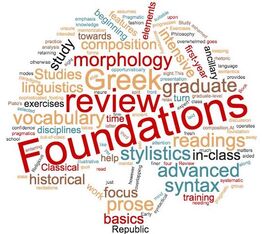Greek 750 | Foundations of ancient GreekSyllabus |
Foundations of Greek
|
Vertical Divider
|
This course is intended for first-year graduate students in Classical Studies, and for graduate students in ancillary disciplines such as Religious Studies and Philosophy who have worked past the intermediate level in ancient Greek. The course assumes an advanced knowledge of Greek which however is not yet expert and thus takes students from basics to sophisticated analysis in intensive fashion. The course operates in four overlapping modes: (1) Review of vocabulary, morphology, syntax. (2) Pragmatic help from historical linguistics. (3) Study of the stylistics of Greek prose. (4) Exercises in Greek composition.
|
Greek: Review
|
Vertical Divider
|
At the front of the course, much emphasis will be laid upon an intensive review of vocabulary and morphology, aided with in-class study of historical linguistics in areas where that provides pragmatic help with understanding and retaining forms and with the semantics. An in-class systematic presentation of the basics of Greek syntax will accompany this review, along with readings from Plato's Republic Book 1. From the very beginning, but more as time goes on, our group readings in the Republic will focus opportunistically on illustrative elements of prose stylistics. In the latter third of the course, the out-of-class work will turn away from memorization and review of basics to composition exercises and study of selected advanced features of the language; towards the very end of the course in-class work will turn to focus on readings at sight.
|
Day by Day
|
Vertical Divider
|
Early on, class time will be split between training in the mental gymnastics of keeping Greek vocabulary, morphology, and syntax fresh in your mind, and training yourself to read Greek prose with confidence and ease. As the semester progresses, we will be able to focus attention more on advanced syntactical features, and matters of rhetoric and stylistics. We will not be ashamed to relax at the beginning with recitations of paradigms and the like; nor will we be overwhelmed towards the end by close discussion of the finer elements of Greek composition.
|
Assessment
|
Vertical Divider
|
|
Books
|
Vertical Divider
|
You will need these physical books.
|
Instructor
|
Vertical Divider
|
William A. Johnson, Professor and Chair, Classical Studies
Allen Building 229B, william.johnson@duke.edu Office hours MW 3:00-4:00, by chance, or by appointment - if my door is open, feel free to knock and come in |
The image above shows substantial foundations and other remains of the Temple of Apollo at the spectacular mountainous sanctuary at Delphi
